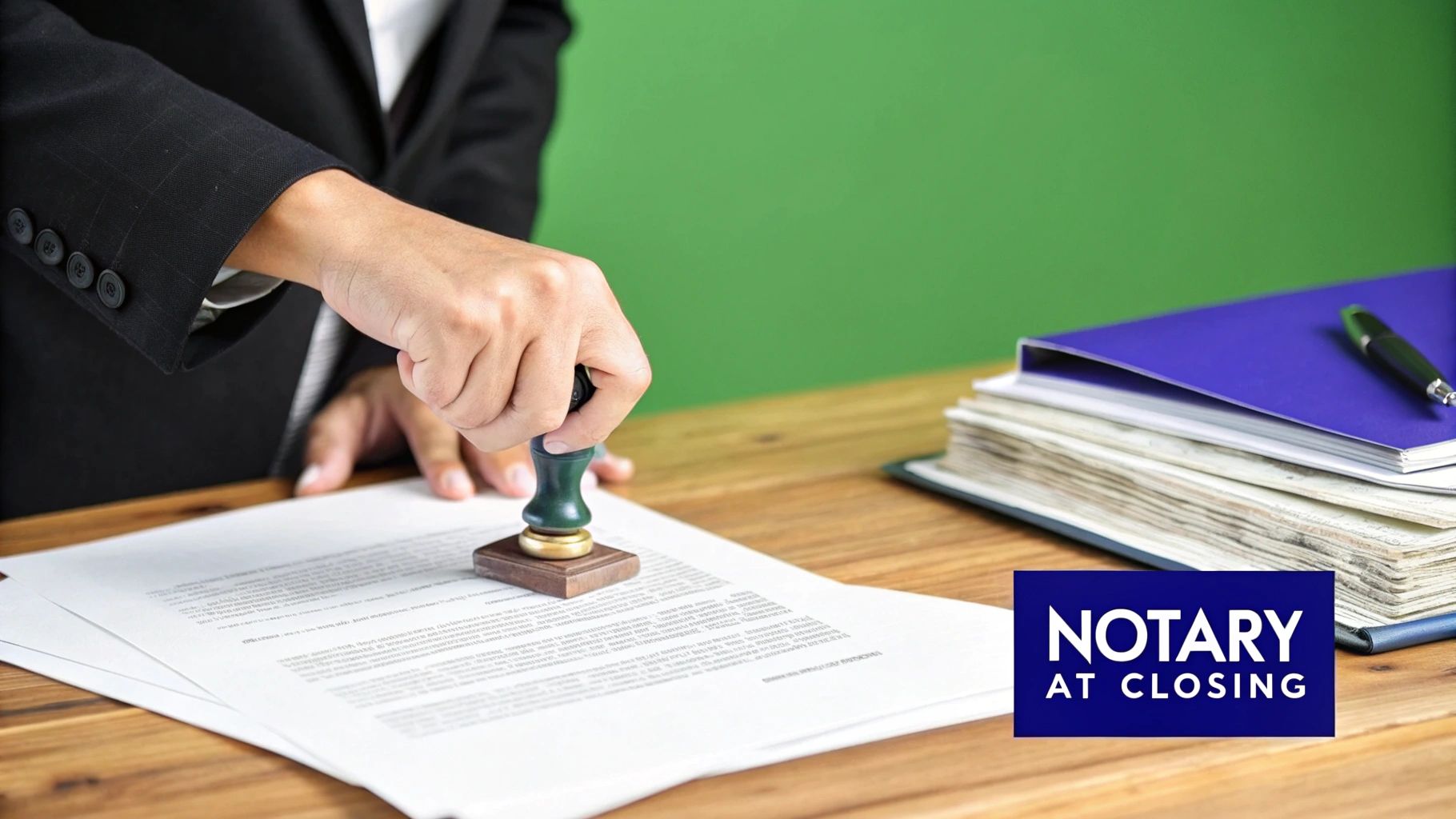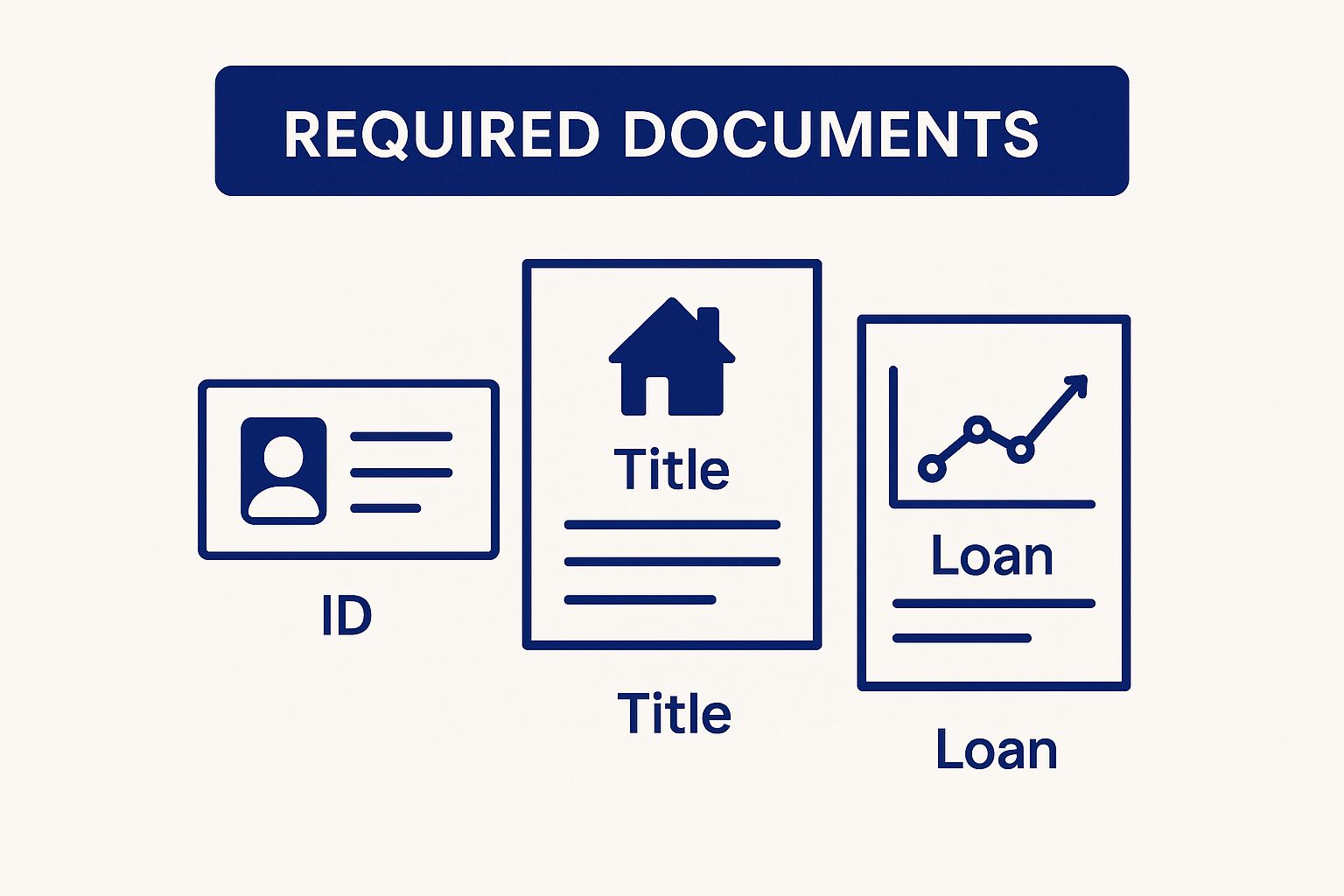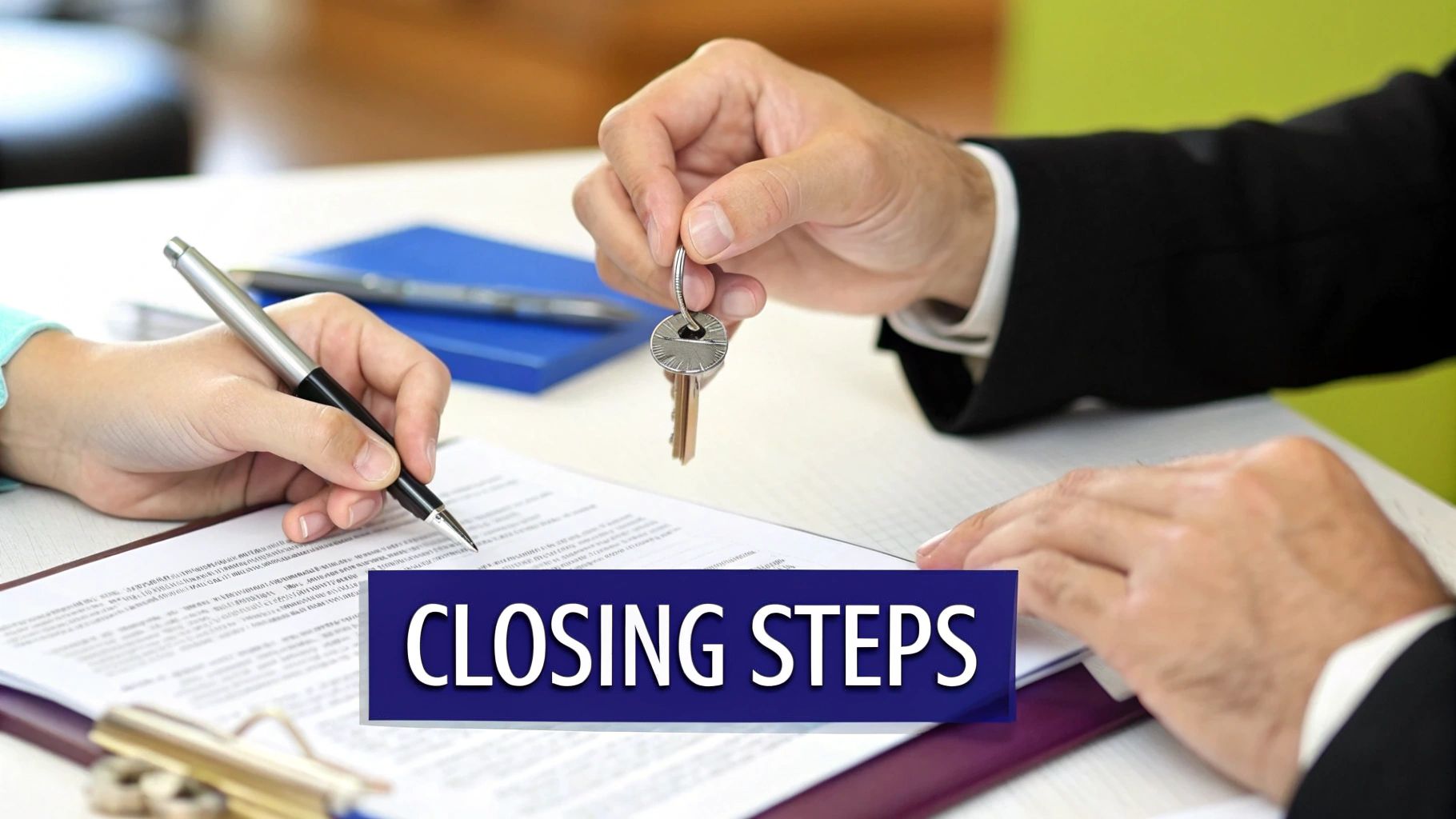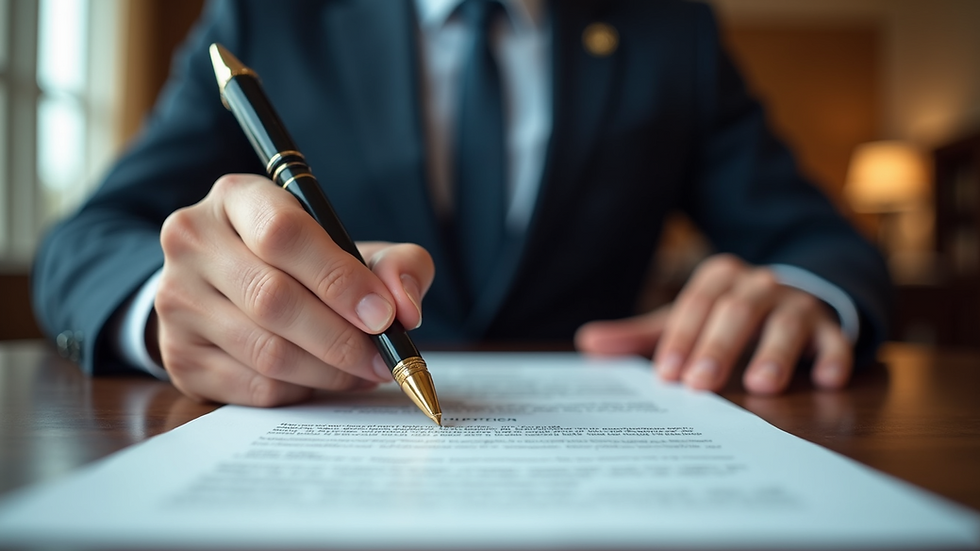Your Guide to the Real Estate Closing Notary
- WebsiteFix Technical Partner
- Jul 3, 2025
- 13 min read
So, what exactly is a real estate closing notary? At its core, this person is a state-commissioned official who serves as an impartial witness when you're finalizing a property deal. Their main job is to verify the identities of everyone signing the documents, watch them sign, and make sure the whole process is done by the book, free from any hint of fraud.
The Gatekeeper of Your Property Transaction
Think of the closing notary as the official gatekeeper for your home purchase or sale. With so much on the line and stacks of legally binding paperwork involved, their presence isn't just a formality—it's a critical layer of security for the entire transaction. They are the neutral third party tasked with protecting the integrity of the deal for the buyer, the seller, and the lender.
This role goes far beyond simply stamping papers. It's about creating a solid, legally defensible record that proves the transaction was authentic and that everyone involved signed willingly. That notary seal is the final, essential step that officially turns a mountain of documents into a legitimate transfer of property ownership.
Core Responsibilities of a Closing Notary
A closing notary’s duties are highly specific and absolutely vital for a smooth closing. They're trained to navigate the complexities of real estate paperwork, ensuring every detail is handled correctly.
Here’s a breakdown of what they actually do:
Verifying Identity: The notary meticulously checks government-issued photo IDs. This confirms that the people signing the documents are who they say they are, which is the first line of defense against identity theft and fraud.
Witnessing Signatures: They must physically watch each person sign the closing documents. This act confirms that the signatures were made willingly, without anyone being pressured or forced into the agreement.
Administering Oaths: For certain documents, the law requires an oath. The notary can administer this legal pledge, where the signer formally swears that the information they've provided is true and accurate.
Maintaining Records: Every notary keeps a detailed log or journal of every notarial act they perform. This journal serves as official evidence that the signing took place, complete with dates, names, and document types.
To give you a sense of how vital this role is, consider this: the real estate notary service market is currently valued at around $4.5 billion and is expected to keep growing. This isn't just a niche service; it's a cornerstone of the American real estate system. You can explore this topic further by reading our guide on the importance of a notary public for legal documentation.
To quickly summarize their duties, here’s a look at their key functions.
Closing Notary Key Functions at a Glance
Responsibility | Why It Matters for Your Closing |
|---|---|
Identity Verification | Prevents fraud and ensures the right people are signing the legal documents. |
Signature Witnessing | Confirms that all parties signed willingly and without being under duress. |
Document Integrity | Ensures all required signatures and dates are properly completed on every page. |
Record Keeping | Creates an official, verifiable record of the signing event for future legal reference. |
Ultimately, the notary’s involvement provides the trust and legal certainty needed to close the deal with confidence.
What to Expect During Your Notary Signing Appointment

Walking into a real estate closing can feel a bit overwhelming. There's often a mountain of paperwork waiting for you, and the pressure to sign everything perfectly is definitely on. But knowing what’s coming can make the whole thing feel much less stressful and a lot more straightforward. Your real estate closing notary is there to be your guide through this final, crucial step.
Think of the appointment as a carefully guided tour of your closing documents. The notary isn’t there to explain your loan terms or give you legal advice. Instead, their job is to serve as an impartial, state-commissioned witness. They verify who you are and then make sure every single signature, initial, and date is in the right place, making the entire process official and legally sound.
Before they even meet you, the notary has already done their homework. They've reviewed the entire loan package to get a lay of the land, flagging all the spots that need your attention and identifying which documents require a specific notarial act, like an acknowledgment or an oath.
The Step-by-Step Signing Process
From the moment the notary arrives, the process is all about accuracy and following the rules. It's a predictable sequence designed to get everything right the first time.
Identity Verification First: Before a single pen hits paper, the notary will ask to see your ID. This is non-negotiable. You'll need to show a valid, unexpired government-issued photo ID, like a driver's license or passport. It's absolutely critical that the name on your ID exactly matches the name printed on your loan documents, so double-check this ahead of time to avoid any snags.
Guided Document Review: Next, the notary will walk you through the stack of documents, typically one by one. They will briefly state the title or purpose of each form and point to the specific lines where you need to sign, initial, or write in the date. Your job is to listen carefully and follow their lead. Even one missed signature can cause major closing delays.
Key Document Signing: While every page is important, some carry more weight than others. The notary will pay special attention to critical documents like the Deed of Trust (the document that secures the property to the loan) and the Promissory Note (your official, legally-binding promise to repay the lender).
This highly structured approach is what prevents costly errors. The notary’s methodical process turns that intimidating mountain of paper into a manageable checklist, getting you one step closer to holding the keys to your new home.
Important Takeaway: A notary is legally prohibited from interpreting or explaining the terms of your loan, such as your interest rate or payment details. If you have any questions about the financial specifics of your agreement, you must contact your lender or real estate agent before the signing appointment.
Finalizing the Transaction
Once the last signature is down, the notary performs their final, crucial duties. These are the steps that officially cement the transaction and make it legally binding.
The notary will complete the notarial certificates on every required document. This involves affixing their official seal or stamp and adding their own signature. This formal act is their sworn statement that they properly identified you and witnessed you sign the documents.
Finally, they will meticulously record the signing in their notary journal. This logbook is a permanent legal record containing the date, time, type of documents notarized, and your signature. It serves as undeniable proof that the notarization occurred, protecting everyone involved and locking in the legitimacy of your property transfer.
Choosing Between Mobile and Remote Notarization
When it comes to signing your final real estate documents, you’re no longer chained to a title company’s conference room. Technology has opened up two convenient paths for getting your paperwork notarized: the tried-and-true mobile notary and the modern Remote Online Notarization (RON). The right one for you really boils down to your comfort with technology, your state’s specific laws, and what your schedule demands.
A mobile notary is exactly what it sounds like—a real estate closing notary who travels to you. They can meet you at your home, your office, or even a local coffee shop. This approach offers a personal touch and the comfort of face-to-face interaction. It’s the classic, time-tested method, perfect for anyone who prefers handling physical documents and having an expert right there in the room.
On the other hand, Remote Online Notarization (RON) lets you handle the entire signing from your computer or smartphone. Using a secure audio-visual platform, you connect with a commissioned notary from literally anywhere you have an internet connection. This digital-first option provides incredible flexibility, especially for out-of-state buyers or people with jam-packed schedules.
The Shift to Digital Notarization
The real estate world is steadily moving toward digital solutions, and it's changing how deals get done. The global market for real estate notary services was valued at around $14.5 billion in 2023, and it's expected to climb as more people embrace digital closings. This growth is heavily driven by online services, which are pushing even traditional notaries to get comfortable with new tech.
No matter which route you take, being prepared is key. This image highlights the typical documents you'll need to have ready for your signing, whether it's happening across a table or across a screen.

Having your ID, title paperwork, and loan documents organized ahead of time makes for a smooth, stress-free closing. It’s a simple step that makes a huge difference.
Mobile Notary vs. Remote Online Notarization (RON) Showdown
So, how do you pick? To help you choose the best notarization method for your real estate closing, think about the trade-offs between convenience, location, and technology. While a mobile notary brings the service to your doorstep, RON brings it directly to your screen. Both methods are secure and legally binding in authorized states, but they serve different needs and preferences.
The best choice isn't about which method is objectively "better," but which one is better for you. This table breaks down the key differences.
Feature | Mobile Notary (In-Person) | Remote Online Notarization (RON) |
|---|---|---|
Location | Anywhere you can physically meet. | Anywhere with a secure internet connection. |
Convenience | High; the notary comes to a location of your choice. | Highest; no travel required for anyone involved. |
Technology | Minimal; requires only physical documents and a pen. | Requires a computer/smartphone, webcam, and stable internet. |
Security | Secure through in-person ID verification. | Highly secure with multi-factor authentication and tamper-evident seals. |
Ultimately, both options empower you to close on your property with confidence, just in different ways. If you want to get a better handle on the technology behind digital signings, you can explore our guide on how remote online notary services provide secure and convenient solutions.
Decoding the Costs of a Closing Notary

Trying to make sense of the costs in a real estate transaction can feel overwhelming, but the fee for your real estate closing notary is one piece of the puzzle that's refreshingly straightforward.
The good news? This isn't some surprise charge you'll need to cover on closing day. Instead, it's a standard line item rolled right into your overall closing costs, just like appraisal fees or title insurance. It's paid to the professional who makes sure every "i" is dotted and "t" is crossed on your loan documents.
Generally, you can expect the fee for a notary signing agent to fall somewhere in the $150 to $250 range. Of course, this isn't a one-size-fits-all price. A few different factors can cause that number to tick up or down.
Factors That Influence Notary Fees
So, what exactly are you paying for, and why might your fee be different from someone else's? The base rate covers the notary's specialized knowledge of loan documents and their professional liability. But a few common situations can add to the final cost.
Loan Complexity: A straightforward cash deal is much simpler than an FHA or VA loan, which comes with a mountain of extra paperwork. More documents mean more time and attention from the notary, which is reflected in the fee.
Travel Distance: If you're using a mobile notary, their travel time is a real cost. A signing appointment on the other side of the city will naturally cost more than one just down the street to cover their gas and time.
After-Hours Service: Need to sign on a Saturday morning or late on a weeknight? Convenience comes at a price. Expect to pay a premium for signings outside of standard business hours or on holidays.
Document Printing: It might not seem like a big deal, but loan packages can easily exceed 150 pages. The notary often has to print two full copies—one for you and one for the lender—and that printing cost gets factored into their fee.
Key Insight: That fee on your statement covers far more than just a quick signature and a stamp. You're paying for the notary's specialized training, insurance, annual background check, travel, document prep, and the crucial responsibility of ensuring your closing is legally binding.
Finding the Notary Fee on Your Closing Disclosure
You won't have to hunt for this cost. Federal law mandates that your lender provide you with a Closing Disclosure (CD) at least three business days before your closing. This five-page document is your final, detailed breakdown of every single cost involved in the transaction.
Look for the notary fee in Section C, "Services You Can Shop For." It might be explicitly labeled "Notary Fee" or "Signing Fee." Sometimes, it's bundled with the title company's charges under a "Settlement Fee." Taking a moment to review this section of your CD gives you total transparency and peace of mind about where your money is going.
How to Verify Your Notary Is Qualified
When you get to the closing table, the person across from you with the stamp and journal isn't just any notary. Or at least, they shouldn't be. A standard notary public can witness a signature on a simple document, but a real estate closing is an entirely different league. It's a complex financial event, and you need a specialist in the room.
This is where the crucial difference between a general notary and a certified Notary Signing Agent (NSA) comes into play. An NSA is a notary who has invested in advanced training specifically for mortgage loan documents. They know the difference between a Note and a Deed of Trust and understand why every signature and date has to be perfect.
Handing over the final paperwork for your home to someone without that specific training is a gamble you don't want to take. A simple mistake could delay funding or even create legal headaches down the road. Taking a moment to verify your notary's qualifications is about giving yourself peace of mind that a vetted professional is handling your transaction.
Key Credentials to Confirm
You absolutely have the right to know who is handling your closing. A seasoned professional will be proud of their credentials and happy to share them. Before your appointment, here are the three things you should look for.
Notary Signing Agent (NSA) Certification: This is the big one. Ask if they are a certified NSA. The National Notary Association (NNA) is the industry gold standard for this. This certification means they've passed a rigorous exam on loan documents and are committed to staying current with lending regulations.
Annual Background Check: Lenders and title companies insist on this. Every single year, a signing agent must pass a thorough background screening that goes far deeper than the basic check required for a notary commission. It's a non-negotiable layer of security for everyone involved.
Errors & Omissions (E&O) Insurance: While not always required by the state, any serious NSA will carry their own E&O insurance policy. A policy of $100,000 or more is common. This protects you from any financial loss that could result from an honest mistake or clerical error on the documents.
Pro Tip: Don't hesitate to ask the title company or signing service that hired the notary. A simple question like, "Can you confirm the notary assigned to our closing is an NNA-certified signing agent with a current background check and E&O insurance?" is perfectly reasonable.
Taking Action to Verify
So, how do you check? It's actually pretty straightforward.
The simplest way is to ask the title company or lender who scheduled the signing. They are responsible for hiring qualified professionals and should have no problem confirming the agent’s credentials for you.
If you want to do your own homework, you can use the NNA’s public directory at SigningAgent.com. If the notary is NNA certified, you can often look them up and see their credentials, including whether their certification and background check are up to date. A few minutes of due diligence ensures the person handling one of the biggest financial transactions of your life is truly up to the task.
Common Pitfalls to Avoid on Closing Day
Getting to closing day is a huge milestone, but a few simple, avoidable mistakes can trip you up right at the finish line. Knowing what to watch out for ahead of time is the best way to make sure your appointment with the real estate closing notary is quick, easy, and stress-free.
Believe it or not, one of the most common snags is showing up with the wrong kind of ID. Your notary has a strict legal duty to verify who you are, and that means they can only accept a current, unexpired, government-issued photo ID. An expired driver's license, a temporary paper copy, or even an ID where the name doesn't perfectly match your loan documents will stop the signing cold.
Ensuring Everyone Is Present
Another classic misstep is thinking that not everyone on the loan needs to be there. If there's more than one person on the title or mortgage, every single one of them has to be present at the signing appointment, with their valid ID in hand. No exceptions.
What if someone truly can't make it? A Power of Attorney (POA) can work, but this isn't something you can arrange on closing day. You have to get this sorted out with your lender and title company well in advance to make sure the POA document is drafted correctly and approved by all parties.
Critical Reminder: The notary is there to watch you sign. Never, ever sign or date any closing documents before you're sitting with the notary and they tell you to. Any documents you sign beforehand are invalid and will be rejected, leading to major delays.
Final Checks for a Flawless Closing
To make sure your appointment goes off without a hitch, run through this quick checklist before you meet your real estate closing notary.
Confirm All Signers: Who needs to be there? Double-check the list of signers and make sure every single one has the appointment locked in their calendar.
Check Your ID: Pull out your government-issued photo ID right now. Is it expired? Does the name on it match your closing documents exactly?
Review Your Closing Disclosure: Your final numbers shouldn't be a surprise. Go over the Closing Disclosure with your lender beforehand to iron out any questions.
By tackling these potential issues before they happen, you can avoid that last-minute panic and make sure the only thing left to do is get the keys to your new home.
Frequently Asked Questions About Closing Notaries
Even after walking through the entire process, it's completely normal to have a few lingering questions about your real estate closing notary. This is a massive transaction, after all! Let's clear up some of the most common things that pop up for buyers and sellers.
Can I Choose My Own Real Estate Closing Notary?
Generally, the title company or your lender will be the one to select the notary signing agent for your closing. They have established relationships with professionals who they know meet their strict insurance requirements and have passed recent, in-depth background checks.
While you don't usually get to pick your own notary when a lender is involved, you absolutely have the right to ask the title company about their vetting process. For a private sale without a lender, however, the responsibility of finding and hiring a qualified notary often falls to you.
What Is a Notary Signing Agent?
Think of a Notary Signing Agent (NSA) as a specialist. While they are a Notary Public, they've gone through extra training focused entirely on real estate loan documents. They are the experts who guide you through that thick stack of papers at closing, making sure every signature, initial, and date is exactly where it needs to be.
A standard notary can witness a signature on any document, but an NSA knows the specific anatomy of a mortgage package. It's important to know they legally can't explain your loan terms or give legal advice, but their role in ensuring the paperwork is flawless is absolutely critical.
What ID Do I Need for My Closing Appointment?
You’ll need to present a current, unexpired, government-issued photo ID. The name on your ID must perfectly match the name on your loan documents, so it's a great idea to double-check this beforehand to avoid any last-minute hiccups.
The most commonly accepted forms are:
A state-issued driver’s license
A state-issued identification card
A U.S. passport or passport card
A U.S. military ID
Curious about why the notarization process is so formal and essential? We break it all down in our guide on unlocking the power of notarization.
Need a reliable, certified notary for your real estate documents? Signature on Demand offers 24/7 mobile and remote online notary services to ensure your closing is handled professionally and conveniently. Visit Signature on Demand to book your appointment today.




Comments